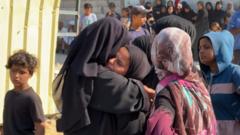As Israel initiates a 'tactical pause' in its military actions, significant aid deliveries from Jordan and the UAE aim to alleviate the dire humanitarian situation in Gaza, where starvation and violence continue to escalate.
**Gaza Aid Drops Introduced Amid Ongoing Humanitarian Crisis as Israel Implements 'Tactical Pause'**

**Gaza Aid Drops Introduced Amid Ongoing Humanitarian Crisis as Israel Implements 'Tactical Pause'**
Jordan and the UAE deliver crucial aid to Gaza following Israel's military pause to address increasing humanitarian needs.
The humanitarian crisis in Gaza has drawn further international outcry as Jordan and the UAE conduct aid drops following Israel's announcement of a temporary halt to military operations aimed at alleviating suffering in the beleaguered region. On Sunday, Jordan's military confirmed that it had coordinated with its Emirati counterpart to drop 25 tonnes of aid across three separate drops into Gaza. Accompanying these air drops, a convoy laden with supplies entered from Egypt, with more support expected from Jordan.
Israel has committed to allowing a 'tactical pause' in its military actions from 10:00 AM to 08:00 PM local time, during which aid corridors are to be established, ostensibly to counter allegations of intentional starvation among the population. However, reports from local medics indicate that violence continues, with nine individuals reported killed and over fifty injured due to Israeli fire near aid convoy routes.
Witness accounts and verification from the BBC indicate that airstrikes have occurred even during designated pauses, raising concerns about the effectiveness of these humanitarian measures. Civilians in Gaza have been seen frantically trying to access meager distributions of food, with alarming reports of malnutrition and starvation surfacing.
The United Nations has reported that a substantial portion of Gaza's two million residents face severe food scarcity, with estimates suggesting that more than a third go days without meals. In response to international pressure, including remarks from UK Foreign Secretary David Lammy that called for more substantial measures beyond the short-term aid provided by air drops, Israeli Prime Minister Benjamin Netanyahu insisted that secure routes for aid delivery had always been available.
Despite these developments, Gazans express cautious hope as they navigate a complicated landscape of aid and ongoing conflict. Personal accounts portray a grim reality, as residents lack access to basic food items and are fearful that any improvement will be temporary. As military pauses establish new parameters for aid delivery, anxious Families in Gaza continue to wait for a more permanent solution to their ongoing crisis.
Israel has committed to allowing a 'tactical pause' in its military actions from 10:00 AM to 08:00 PM local time, during which aid corridors are to be established, ostensibly to counter allegations of intentional starvation among the population. However, reports from local medics indicate that violence continues, with nine individuals reported killed and over fifty injured due to Israeli fire near aid convoy routes.
Witness accounts and verification from the BBC indicate that airstrikes have occurred even during designated pauses, raising concerns about the effectiveness of these humanitarian measures. Civilians in Gaza have been seen frantically trying to access meager distributions of food, with alarming reports of malnutrition and starvation surfacing.
The United Nations has reported that a substantial portion of Gaza's two million residents face severe food scarcity, with estimates suggesting that more than a third go days without meals. In response to international pressure, including remarks from UK Foreign Secretary David Lammy that called for more substantial measures beyond the short-term aid provided by air drops, Israeli Prime Minister Benjamin Netanyahu insisted that secure routes for aid delivery had always been available.
Despite these developments, Gazans express cautious hope as they navigate a complicated landscape of aid and ongoing conflict. Personal accounts portray a grim reality, as residents lack access to basic food items and are fearful that any improvement will be temporary. As military pauses establish new parameters for aid delivery, anxious Families in Gaza continue to wait for a more permanent solution to their ongoing crisis.


















